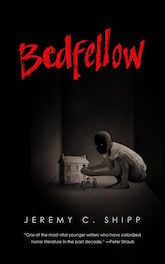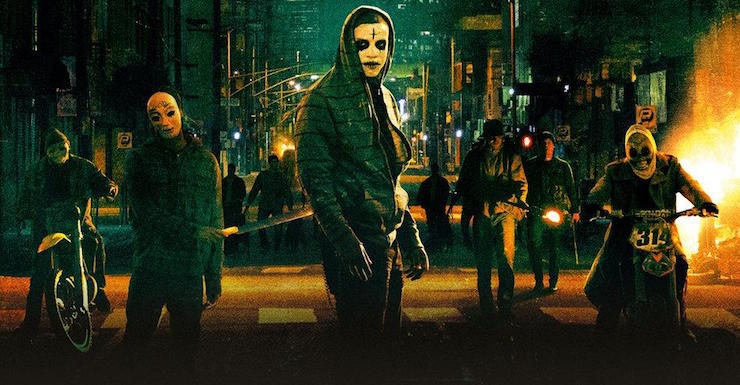As reviewer Danny Bowes stated in his discussion of the original movie, The Purge is a home-invasion thriller with a neat high concept: the Sandin family take in a bleeding stranger and then have to contend with the band of preppy murderers who want to kill him. And they can’t call the police because it’s the Purge: the one night a year when all crime in the United States, including (and primarily) murder, is legal.
If you’re thinking, “hey, the Purge sounds less like some kind of national Rumspringa and more like a way for the government to outsource killing off the poor to affluent thrill killers,” congratulations—as the film’s three sequels and upcoming spin-off TV series explain, that’s exactly the point. The government even goes so far as to send in military personnel disguised as citizens to make sure the kill count remains high.
It’s a great premise for pointed satire about how laws protect the rich from the poor but not vice versa, and how easily people explain away and justify cruelty as patriotism and piety. However, as long as writer-director James DeMonaco sticks to the survival horror genre, focusing on the moment-to-moment struggle to remain alive during the Purge itself, he’s leaving the most interesting parts of his own premise on the table.
Survival horror is all about, well, surviving something monstrous without the ability to run away or call for help, either because of isolation (e.g. at a ice station in Antartica) or because the help needed just doesn’t exist (e.g. the cops can’t arrest a nightmare man). Dystopian fiction relies on both: not only are citizens in Purge America stuck there, the people they would call for help are actively trying to kill them.
The Purge is all about how to survive without the law and whether humans without government inexorably revert to a Hobbesian existence: solitary, poor, nasty, brutish and short. Those are the common questions of all Frontier fiction, whether it’s the Western, the Gangster pic, the Space Exploration show, the Superhero comic, etc. Any story where the protagonists must rely on their own strength, and particularly on their own capacity for violence, will raise questions about what someone would do to survive, and what psychological toll that would take.
Not that there isn’t still room to play in this space, but what makes the concept of the Purge unique is that the Purge ends. That after twelve hours of reckless, violent abandon, the whole country is supposed to go back to normal and carry on as if nothing happened.
That raises questions that can’t be raised in works like Lord of the Flies or Mad Max, specifically: Who would think this is a good idea? How do the individuals that participate in the Purge live with themselves afterwards, knowing that only fear of the law keeps them from doing horrible things? And how would anyone get on with their life, knowing that violent chaos lurks just beneath the surface of order, erupting regularly in controlled bursts?
The tagline of the franchise’s new TV series is “Will You Hide, or Will You Seek?” So far, we’ve really only followed the stories of those that hide, those that are either victims of the Purge or actively oppose it, and only during the Purge itself. Almost everyone we’ve seen that “seeks,” that is, puts on a mask and goes out spree killing, is a sociopathic cartoon person. The one exception—the Sergeant in The Purge: Anarchy who sets out to kill the man who killed his son—in the end decides to spare his life, because, hey, killing is real bad and you shouldn’t do it. And you shouldn’t like people who do.
But, as the tagline suggests, maybe a night of lawlessness does appeal to you on some level, and it would be interesting to see relatable protagonists who find freedom in anarchy—tragic figures who make terrible choices, but for understandable reasons. After all, the Purge nominally represents an opportunity to bring vigilante justice to those the law was too lenient on. And putting murder aside, there are plenty of other crimes a seemingly moral person might commit if given the chance. What vices would they indulge? What risks would they take? How badly would they park?
Buy the Book


Bedfellow
And again, that’s only covering the period during the actual Purge. To me, the most interesting parts of the story all happen afterwards. What are the emotional ramifications of indulging their darker impulses? Are they truly freed from their destructive thoughts and emotions, as those that promote the Purge declare? Or are they wracked with guilt, as Poe or Dostoyevsky would suggest? Or is their hunger for violence and thirst for power only whetted by being fed, so that it grows and grows between Purges?
How do they face their neighbors after their darkest impulses have been laid bare? Do they crack up under pressure? Are they driven mad? If they get into fights or disagreements, are they told to save it for the next Purge?
And even if one doesn’t personally choose to break the law every chance one gets—how does one continue to live with the people that do? How do the Sandins continue to live next to neighbors that tried to stab them all with butcher knives? Do they have to move to a new town? A new state? Out of the country? Does everyone walk around with a form of post-traumatic stress disorder?
These are all questions that can’t be answered, can’t even really be asked, when confined within the strict limits of the survival horror movie format, where the protagonists don’t have time to ruminate on their crimes before the next monster in a plastic mask and bow tie comes spinning around a corner. They are questions DeMonaco does not seem interested in asking or exploring at all.
And yet, those very questions are what distinguish The Purge franchise from other horror stories, so if the series is going to continue (and boy, does it seem like it’s going to continue), it’s time to step up and answer the burning questions of what happens after the Purge.
Steven Padnick is a freelance writer and editor. By day. You can find more of his writing and funny pictures at padnick.tumblr.com.










